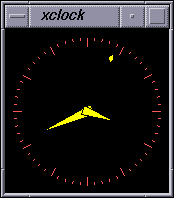 .
.
One scenario where this would be useful is in a local client/server environment, where Mosaic is used as a front end to a number of other applications -- a document could explain what various applications do, and hyperlinks would cause the applications to be launched on the local machine.
As of Mosaic 2.0 prerelease 4, this is now possible. This opens up a number of questions and security concerns, and this document attempts to address both.
application/x-csh; csh -f %s
application/x-csh. (Or, an
entry could be placed in a user or system extension map to associate
extension .csh with type
application/x-csh, and a document
foo.csh could be accessed on the local filesystem or
on an FTP server.)
csh -f will be used as the "viewer" for the
document, which means the shell script -- whatever it happens to
contain -- will be executed on the client's host.
As an example, if you have the above mailcap entry in place, the following
hyperlink will start up /usr/bin/X11/xclock on your host.
If you do not have a direct Internet connection, the following hyperlink will
have to be edited to point to your local HTTP server.
 .
.
application/x-csh or anything similar in the default
settings, this is not a security hole unless you
specifically modify your config files to make it so.
However, as soon as you add the entry for
application/x-csh as above to your user or system mailcap, you have a security hole. A
malicious information provider (anyone running a server) could
construct a dangerous shell script referenced by an innocuous
hyperlink in one of his/her documents, and you could click on it and
cause it to be fired off on your system without realizing
what's going on.
application/x-csh (and similar) documents; the utility
program will do the following:
csh if the user
selects "Yes".
Such a program doesn't exist yet; we may write it. (The assumption does exist, however, that the user is qualified to judge on the fly whether a given shell script is safe to run.)
Note: The following shell script, safecsh, is one
possibility; it uses a semi-standard X utility called
xmessage to display any encountered csh
scripts and query the user.
#!/bin/csh -f xmessage -buttons "Execute this file,Cancel" -file $1 if ($status == 101) then csh -f $1 endifThanks to friendly user Michael Frank for the suggestion.
foobar/236454531154) as the
signifier for a shell script on both the client and server side.
This means that your client will not execute shell scripts on
other sites of type application/x-csh or anything
similar, but will execute shell scripts coming off your own
server as your special type.
But, were a person with malice in his/her heart to take a
close look at your server and see that it's serving shell scripts
as type foobar/236454531154, he/she could then
construct a bomb on his/her server by using exactly that type,
and you could get hit while browsing the net. The only way to
get around this is to prohibit off-site accesses (or use some
even tighter method of control). We are adding such capabilities
to NCSA httpd, and other servers may either already have or will
soon have such capabilities.
application/x-csh and the like are used. If Mosaic
in such a state is only used to access local, approved files that
are known to be safe, then you won't get your filesystem nuked
just by browsing the net. (Maybe make a shell script, e.g.
xdangerousmosaic, that fires up Mosaic with a
different globalTypeMap resource setting, to make
this explicit.)